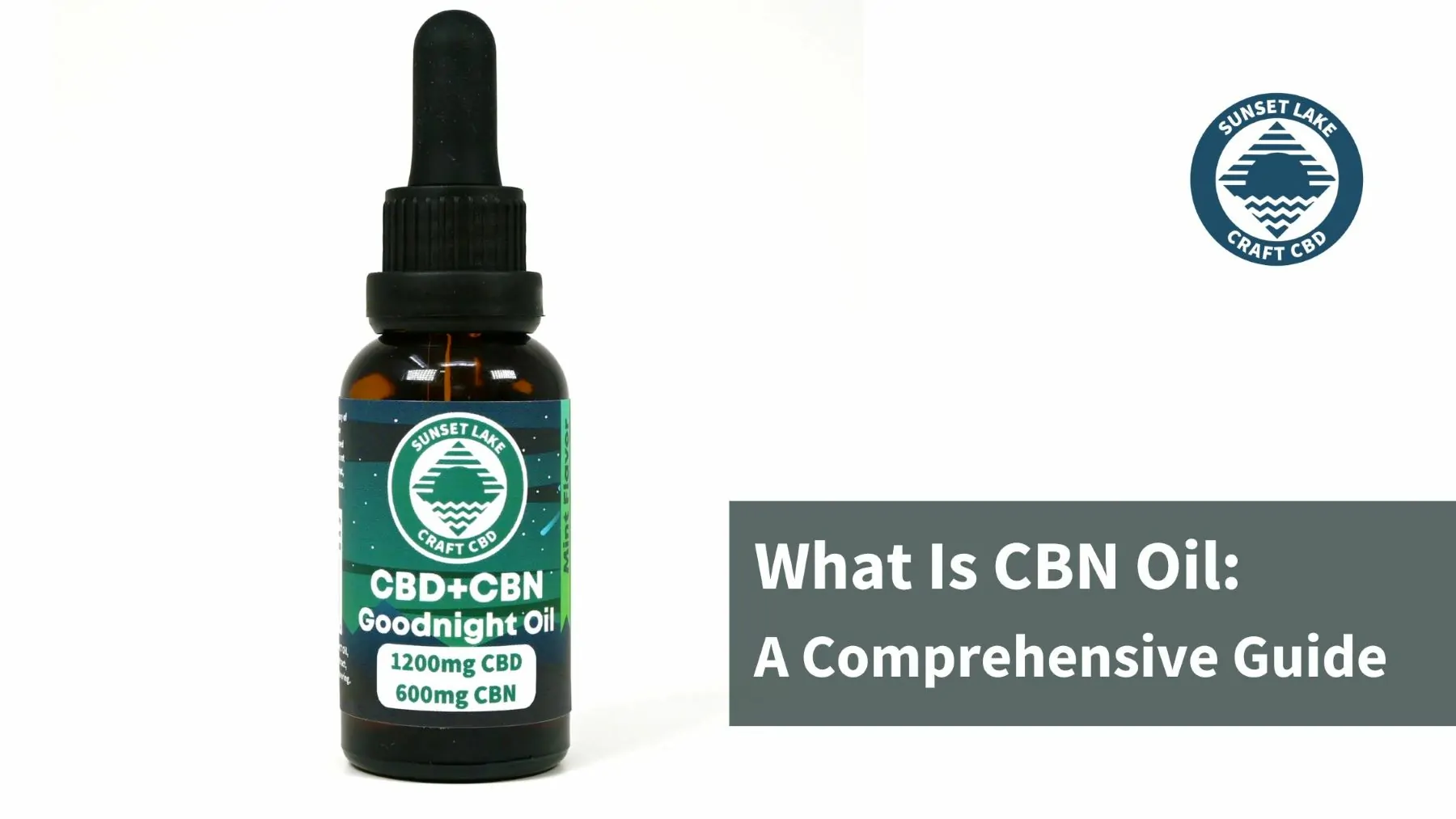CBN, as a cannabinoid, has been around for decades. Still, it’s just now getting its moment in the spotlight—or should we say it’s getting infused into a whole basket full of sleep-aid products. CBN oil can help you quiet your racing thoughts and ease into bed when used properly.
In this post, we’re going to cover:
- What CBN oil is
- What CBN’s potential benefits are
- How to take it to help with sleep
- And address some of the internet’s most common questions
What is CBN Oil?
CBN oil is an oil, usually MCT, that’s been infused with the cannabinoid CBN, shorthand for cannabinol. CBN oil can also contain other ingredients, which we’ll discuss in more detail later in this post. CBN is created when THC, the psychoactive component of cannabis, breaks down due to exposure to light and air. Despite its origin, CBN is not psychoactive, making it a popular choice for those seeking therapeutic benefits without the high associated with THC.
CBN oil is often derived from industrial hemp plants to comply with legal standards. This ensures that the oil contains minimal THC, typically less than 0.3%, making it non-psychoactive and legal in many regions. However, it’s always advisable to check local regulations as they can vary significantly.
The Spectrum of CBN Oil
CBN oil can come in three distinct varieties: full-spectrum, broad-spectrum, or isolate-based. Understanding these varieties can help you choose the right product for your needs:
- Full-spectrum: Contains all cannabinoids present in the cannabis/hemp plant at harvest, including trace amounts of THC. This type of oil takes advantage of the “entourage effect,” where multiple cannabinoids work together to enhance therapeutic benefits.
- Broad-spectrum: This is full-spectrum CBN oil with THC cannabinoids removed. It still provides the entourage effect but without any THC.
- Isolate-based: Made with a carrier oil and isolated CBN. No other cannabinoids should be present. This is ideal for those who want to avoid THC altogether or are subject to drug testing.
To determine the type of CBN oil you’re considering, look at its third-party certificates of analysis. These lab documents will show which cannabinoids are in your product and at what concentrations. This transparency helps ensure you are getting a product that meets your needs and preferences.
What Does CBN Oil Do?
CBN is still a relatively understudied cannabinoid, but there have been a few non-FDA studies that suggest it may help with:
- Promoting Sleep: One of the most touted benefits of CBN oil is its potential to aid in sleep. It is believed to have sedative properties, making it a popular choice for those struggling with insomnia or other sleep disorders.
- Pain Management: Some users report that CBN oil helps alleviate chronic pain and inflammation, offering a natural alternative to over-the-counter and prescription pain relievers.
- Appetite Stimulation: While not as potent as THC in this regard, CBN may help increase appetite, which can be beneficial for individuals dealing with conditions that cause a loss of appetite.
- Nausea Relief: Similar to other cannabinoids, CBN may help reduce nausea, making it useful for those undergoing treatments like chemotherapy.
- Localized Immune Response: CBN may also support the immune system, although more research is needed to confirm these effects.
How Do You Take CBN Oil for Sleep?
Of the potential benefits listed above, promoting sleep is CBN’s biggest selling point. While calling CBN a guaranteed sleep aid would be misleading, there are ways that you can work CBN oil into your sleep routine.
- Sublingual | Est. Time to Effect: 15 Minutes
The first and faster way of taking CBN oil requires filling up your dropper, assuming your product comes with a dropper bulb and pipette. Fill the pipette to your desired dosage and put the oil under your tongue. Let the oil sit there for about 20 seconds before you swallow. This method is called sublingual ingestion.
Because the membrane is so thin under your tongue, CBN can enter your bloodstream more quickly here than in your digestive system. This rapid absorption can help you feel the effects sooner, making it easier to drift off to sleep. - Consuming | Est. Time to Effect: 45 Minutes
The second, more gradual way to take CBN oil is to swallow your desired dosage directly or put it in a beverage. Without letting the oil sit under your tongue, you’ll force the CBN in your oil to enter your bloodstream more slowly.
The added benefit of slower absorption is that the effects of the cannabinoids should last longer than if you were to use your CBN oil sublingually. This can be particularly useful if you tend to wake up in the middle of the night, as the effects may help you stay asleep longer.
Will CBN Oil Change How You Sleep?
Adding CBN oil to your sleep schedule isn’t likely to change how you sleep fundamentally. As a naturally occurring substance, CBN is a gentle cannabinoid. It won’t turn you into someone who can sleep through your alarm, but it can help improve the quality of your sleep.
CBN will allow your body and mind to relax so that you can fall asleep more easily. By reducing anxiety and promoting relaxation, it can help you achieve a more restful sleep. However, individual responses can vary, so it’s important to find the right dosage and method of ingestion that works for you.
Will CBN Oil Make You Groggy in the Morning?
Unfortunately, there isn’t a one-size-fits-all answer to this question. Waking up groggy is a function of many different factors, including where in your sleep cycle you wake up.
Grogginess after taking CBN oil can depend on your dosage, when you took your dose before bed, and the presence of other cannabinoids. Starting with a lower dose and adjusting gradually can help minimize the risk of morning grogginess. Additionally, experimenting with different ingestion methods and timing can help you find the optimal routine for your needs.
Can CBN Oil Make You Hungry?
There is some evidence that suggests CBN can be an effective appetite stimulant. If your question is more, will taking CBN oil turn you into a midnight fridge raider—probably not.
CBN and full-spectrum CBD products may affect your appetite, but not in the way that THC products give you the “munchies.” Instead, CBN may help regulate your appetite, making it beneficial for those with conditions that affect their ability to eat regularly.
Can You Mix Melatonin and CBN Oil?
You can mix melatonin with CBN and cannabinoid products in general. Sunset Lake CBD sells melatonin-infused sleep products and CBN products that are melatonin-free.
As of this writing, no studies suggest mixing CBN and melatonin is harmful or counterproductive. Combining these two supplements may enhance their sleep-promoting effects, providing a more comprehensive approach to managing sleep issues.
Frequently Asked CBN Oil Questions
- Are There Any Side Effects?
Because federal agencies stifled cannabinoid research for so long, CBN-specific research is in its infancy. We don’t know much about the long-term side effects of CBN use, but we can extrapolate based on what we know about CBD. Side effects of full-spectrum CBD use may include changes in appetite, diarrhea, nausea, dizziness, and upset stomach. - Is CBN Habit-Forming?
As of this writing, CBN has no known addictive properties. It is a gentle cannabinoid that may have potential nighttime benefits. Inconsistent use, however, may lead to disrupted sleep patterns. Regular, consistent use is recommended for the best results. - Does It Interact with Medications?
CBN, and cannabinoids in general, do interact with certain medications in the statin class (and others). You should talk to your doctor and pharmacist before adding any cannabinoids to your nighttime routine. This is particularly important if you are on medications that affect your liver, as cannabinoids are metabolized in the liver. - Will CBN Oil Show Up on a Drug Test?
Your product may trigger a positive drug test. If your CBN oil contains any THC or is labeled as “full-spectrum,” there is a good chance that it will register on a workplace drug screening. Isolate-based and broad-spectrum products should be fine. To learn more about cannabinoids and why some products show on drug tests, see our post about CBD and drug tests here. - Is CBN Oil Psychoactive Like THC?
Because CBN is the oxidated form of THC, it interacts with your endocannabinoid system in much the same way. Because CBN binds to your CB1 receptors, it is technically a psychoactive cannabinoid. That said, you are unlikely to experience the same kind of psychoactive effects that you would with a THC product. Think of CBN as causing drowsiness and relaxation rather than euphoria and time dilation. - Is CBN Oil Legal?
Depending on where you live, CBN oil may or may not exist in a legal gray area. Federally speaking, as long as CBN is derived from cannabinoids harvested from industrial hemp, it’s legal. However, state laws can vary, so it’s important to check local regulations to ensure compliance.
CBN oil offers a fast-acting and potent option for those seeking natural sleep supplements. Before purchasing, ensure the quality of the products by checking testing documents and reviews. Additionally, it’s wise to compare different products and brands to find the best option for your needs. With its potential benefits for sleep, pain management, and more, CBN oil could be a valuable addition to your wellness routine.



